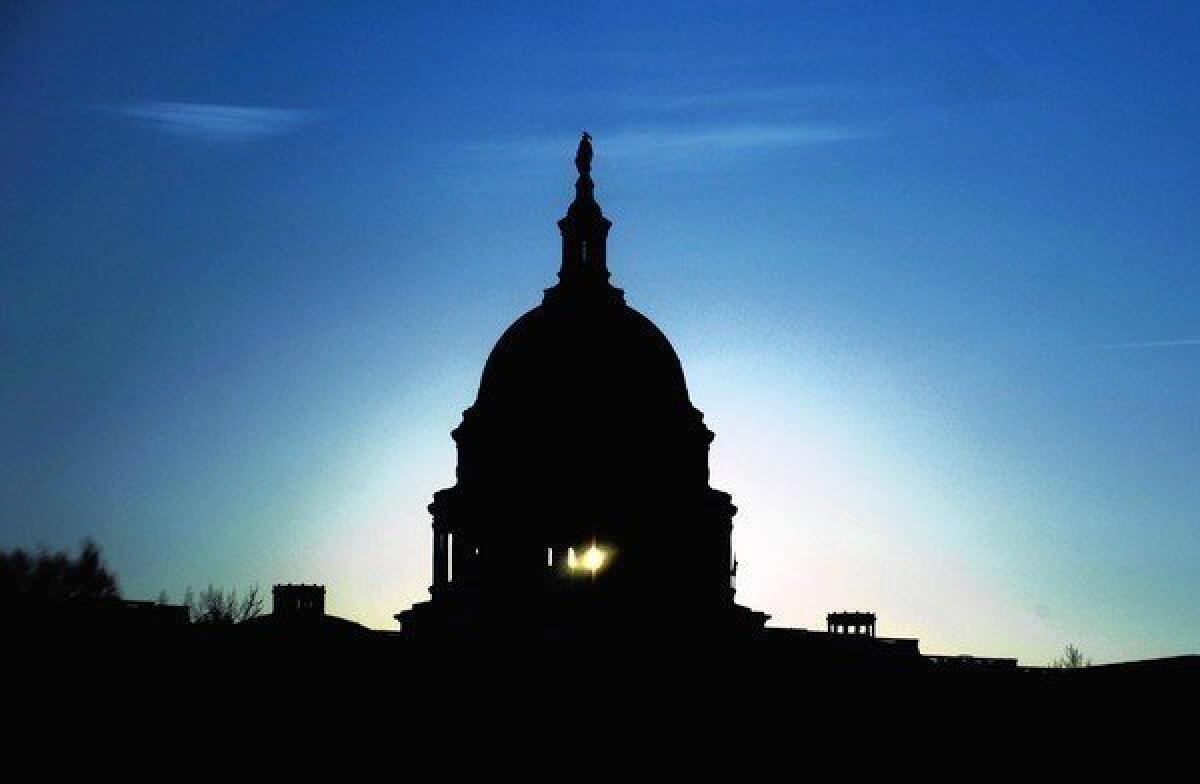‘Sequester’ cuts to hit healthcare hard

- Share via
WASHINGTON — As the Obama administration begins to implement $85 billion in cuts to federal spending this year, no part of the budget other than defense will take a bigger hit than healthcare.
And the so-called sequester appears likely to have a disproportionate effect on areas of the health system already hobbled by years of retrenchment or underfunding, including public health and medical research.
Although the Medicare program will account for the largest chunk of dollars cut from healthcare simply because of its great size, the scheduled 2% reduction in its payments to doctors and hospitals is significantly smaller than what many public health and research programs face.
Laboratories at major universities and medical centers are already laying off scientists, even before the latest round of cuts is scheduled to take effect. And local public health officials, hit by years of cutbacks, are scaling back immunization campaigns and other efforts to track and control infectious diseases.
“They are doing cuts on top of cuts on top of cuts,” said Eric Hoffman, director of the Center for Genetic Medicine Research at Children’s National Medical Center in Washington. Hoffman’s labs have had to delay several major projects, including new research into muscular dystrophy in children.
Also threatened are new initiatives sparked by public health crises such as mass shootings — which have generated calls for strengthening the nation’s mental health system — and outbreaks of food-borne illness.
Compounding the challenges is a lack of direction from Washington. Obama administration health officials have provided little guidance about how they plan to implement many of the cutbacks and when precisely they will hit.
A Health and Human Services Department spokesman said only that the agency would be sending general notifications Friday to those who rely on federal money. More specific instructions will follow. The agency is expected to cut about $15.5 billion from its overall spending, with about two-thirds of that coming from Medicare, which covers the elderly and disabled.
Major medical groups, including the American Medical Assn., the American Hospital Assn. and the American Nurses Assn., have warned that the Medicare cuts will lead to lost jobs. The reimbursement cuts may be particularly difficult for providers with fewer privately insured patients.
“Doctors are very nervous about this,” said Gene Ransom, executive director of the Maryland State Medical Society. “It’s not like the cost of business has gone down.”
But many hospitals and other providers, such as Adventist Health System’s Florida Hospital in Orlando, had already planned for these cuts. “We assumed at the beginning of the budget cycle that this would occur,” Adventist Vice President Rich Morrison said.
Ironically, what worries some medical leaders more is the possibility that Congress and the White House could reach a larger deal to avert the sequester. Any such deal might involve steeper cuts in Medicare or reductions in Medicaid, which was exempted from the sequester.
For now, the budget ax will fall most heavily on programs that already have been battered by years of government cutbacks.
Nationwide, as many as 46,000 public health jobs have been eliminated in the last five years, the Assn. of State and Territorial Health Officials and the National Assn. of County and City Health Officials estimate.
Now, the federal Centers for Disease Control and Prevention plans to cut more. Health and Human Services Secretary Kathleen Sebelius told Congress this month that the CDC cuts could result in 424,000 fewer HIV tests by state and local health programs the agency funds. Of the agency’s $6-billion budget, 70% goes as grants to state and local health efforts.
“These cuts are going to have a real impact,” said Washington state Health Secretary Mary C. Selecky, whose department has seen a 38% cut in state funding over the last six years. “In the next six to eight weeks, we’re going to have to say we’re closed on Fridays or we can’t provide this or that service anymore.”
Anxieties also run high among researchers who rely on grants from the National Institutes of Health. NIH Director Francis Collins told reporters this week that his agency was looking at losing $1.6 billion by the end of the year. That comes after a decade of flat budgets.
“It is so frustrating,” said Heidi Hamm, chair of pharmacology at Vanderbilt University in Nashville. NIH cuts will probably force her to lay off one of the eight researchers in her lab working to develop drugs to prevent the blood clots responsible for heart attacks, she said.
“There has never been a time when scientific breakthroughs are more possible,” Hamm said. “But there has been a steady erosion in what we can do.”
Peter Frost in Chicago, Marni Jameson in Orlando, Andrea K. Walker in Baltimore and Chad Terhune in Los Angeles contributed to this report.
More to Read
Sign up for Essential California
The most important California stories and recommendations in your inbox every morning.
You may occasionally receive promotional content from the Los Angeles Times.














